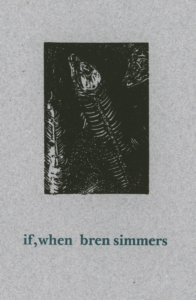By Angeline Schellenberg
If, When
by Bren Simmers
Gaspereau Press (2021)
The first poem in Bren Simmers’ new collection ends “You’re not in an ambulance / speeding towards emergency. / All the wet way home, / your brake lights tell / a different story.” If, When expands that story of our connection as travellers on this vulnerable planet.
We learn in the introduction that Simmers and her great- grandfather Dinty worked in the same region near Squamish, B.C., 100 years apart: he in the Britannia copper mines, Simmers in an environmental centre. Her poetry sets his life alongside her own.
Rather than listing poems in the order they appear, the table of contents offers an “aerial view” of the four themes—Industry, Groundskeepers, Ancestors, and Returns—that cycle throughout the book. Industry explores the Britannia copper mines (1904–1974) and the Woodfibre pulp mill just across the inlet that opened in 1912. Groundskeepers are glimpses of bears—nature reasserting herself. The Ancestors pieces take us inside the minds of Dinty, his wife Isabella, and their one daughter Janet: Simmers’ grandmother. Returns contain Simmers’ own observations of the landscape.
She writes, “Don’t tell me what we’ve lost, show me / what we’ve still got left,” but Simmers does both beautifully: her words telling what once was and the white spaces between columns or stanzas in some pieces forming the shape of a tree, a river, a target.
Simmers’ unanswered questions reveal our relationship to the earth: “If you don’t bike or ski or climb / why live here?” The final poem has residents of her tourist town asking one another, “Do you rent or do you own?”—as if one could possess the land when “we’re just layers of strata.”
There is little separation between past and present in If, When: the effects of the long-ago mining and logging linger. Likewise, the human and non-human swirl together in Simmers’ imagery as “icebergs calve inside ribs.” “Elderberries sprout breast buds,” demonstrating growth is not the same as health.
The reappearing bears that should be frightening are gentle and observant in contrast to the thoughtless violence of humanity. “Icy Hole of Death” is a treacherous bike trail, but in the poem “Lost & Found,” it is the daredevils endangering the mountain ecosystem, not the other way around. Each glimpse of the ursine Groundskeepers moves the reader closer until, in dream, we enter the creature’s mouth to become its muscle.
Simmers offers us, like trapped miners, “a sliver of light through the rubble.” Like a childhood trophy’s inscription weathering away outside the log sort, the effects of humanity on the land can be eroded.
Her vivid “Aubade” captures the sensations of sleeping late on an autumn morning: amid the “whine and thud / of the garbage truck” we “roll into each other like fall’s / windspun leaves … wear prolegs till noon.” In If, When a rest deeper than a lovers’ morning in bed is in view; hope for the earth’s renewal is “a battery to charge.”
“Stay still,” Simmers and her ancestors tell us. Be “chamoised by cedar boughs, / scrubbed clean by bottlebrush.” The most productive way to care for the earth is to do nothing; breathe it in.
Angeline Schellenberg is the author of the Manitoba Book Award-winning linked poems about autism Tell Them It Was Mozart (Brick Books, 2016) and the elegy collection Fields of Light and Stone (University of Alberta Press, 2020) shortlisted for the 2022 KOBZAR Book Award. Her microfiction appears online in Canadian, British, and American journals. Angeline hosts Speaking Crow, Winnipeg’s longest-running poetry open mic.

